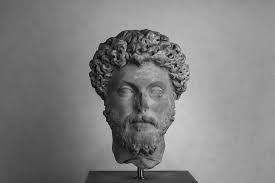Last January, I purchased a book that changed my life for the better. “Meditations” by the Roman Emperor and Philosopher Marcus Aurelius explains what Stoicism means to one who delves into philosophy. Today, some mischaracterize Stoicism as an “alpha male mentality” that teaches people to be emotionless. From my experience, that interpretation couldn’t be further from the truth and the intention of these works.
First and foremost Stoicism prescribes control of one’s emotions. But it mainly directs individuals to center their lives around virtues.
Most of the great Stoic philosophers—Zeno, Seneca, Epictetus and Marcus Aurelius—center their teachings around four values: temperance, courage, wisdom and justice. Every moment of life calls for these virtues. Ryan Holiday, the most prominent contemporary Stoic philosopher, helped me understand these values and how we can apply them to our lives.
Holiday preaches that Stoicism demands that its followers turn the works—books, teachings, lectures—into action. Stoicism is about taking action and creating change; it is about striving for a better life for oneself and others.
I find temperance to be an extremely grounding and mindful virtue. Temperance commands that we can be happy with much less. I used to never think in this manner; I programmed myself to believe that I needed more to be happy—more money, nicer clothes and other empty, materialistic things. Now, I apply temperance in every moment of my life and I have found the happiness I once yearned for. I can be happy with so much less than I have right now. Temperance is gratitude.
Temperance also means self-restraint. Say less than necessary. Do not say things that will harm a relationship. Do not overindulge in anything. Practice being content with less and being in control of your desires. Self-restraint is not only physical or verbal; it is mental. Seneca, in “Letters from a Stoic,” reminds us that “…nothing is burdensome if taken lightly.” Temperance is discipline.
In Stoicism, wisdom is two-fold. First, never lose your thirst for knowledge. We can always learn. Second, you are never done learning and you will never be the wisest person. Everyone can teach you something; you need to be open to the lesson. Wisdom is a never-ending journey.
Courage means endurance, confidence, high-mindedness, cheerfulness and perseverance. Life will throw challenges at us and we will get knocked down. But Stoicism teaches that we can rise every time. Even if we are physically broken down, our minds can endure. Courage means being aware of how your actions represent your virtues; it is being honest with yourself. Courage is everywhere.
Part of justice is, of course, following laws and rules in society. But to the Stoics, it is kindness and fairness. As I have mentioned in previous articles, Marcus Aurelius beautifully wrote in “Meditations,” “kindness is invincible…What can even the most vicious person do if you keep treating [them] with kindness…”
To practice fairness, one must be consistent in the application of their virtues. But it also denotes fairness to oneself. Hold yourself to high standards but remember we are perfectly imperfect. Stoicism does not demand perfection; rather, it demands a commitment to self-growth. Seneca wrote, “What progress, you ask, have I made? I have begun to be a friend to myself.”
Beyond these virtues, the Stoics remind us that we can leave this world at any time. Death is inevitable, and we only get one life in this world, so live freely and in peace. I remind myself of this every day with a coin I got from Amazon. One side is engraved with “Memento Mori,” and the other with “Memento Vivere,” essentially reminding us of death and life.
This simple coin is monetarily worthless, but to me, its value is infinite. It reminds me that so little is of significance in this life. If I were to die now, what would I want my last words, thoughts or actions to be? Conversely, it reminds me of the beauty and gift of life. You only get one life in this world, so live it to the fullest. Live with virtue and live in peace, unaffected by your surroundings and immune to distraction. “Memento Vivere” and “Memento Mori” help me wake up every morning grateful to be alive. A small coin in my pocket helps me embody the four virtues mentioned above.
Yet I do not consider myself to be a Stoic; I do not know how one achieves that title. However, I do know I have work to do.



Michael W • Oct 24, 2023 at 1:06 pm
This was a great piece Tate, and I can’t wait to talk about it more over the Podcast!
Aaron Morales • Oct 14, 2023 at 1:48 pm
interesting.
George L. Lewis Jr. • Oct 14, 2023 at 8:37 am
This response to STOICISM is so remarkable succinct and beautiful it makes me pause to tears. Thank you
Tate Farinacci • Oct 15, 2023 at 2:01 pm
Thank you so much for your kind words! It’s wonderful to hear that it resonated with you on such a deep level. If you have any more thoughts or questions, please feel free to share them. I appreciate your feedback.